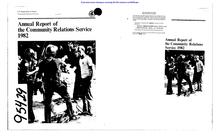Report of the Community Relations Service on Bhagwan Shree Rajneesh followers

Annual Report of the Community Relations Service
Antelope, Oregon
US DOJ
Annual Report of the Community Relations Service
August 24, 1984
Antelope, Oregon. Tension began building in this small town with the arrival in July 1981 of 500 followers of East Indian guru Bhagwan Shree Rajneesh. The focus of the conflict was the group's intention to establish a new home on a 64,OOO-acre ranch it purchased 20 miles from Antelope. Long-time residents said that they feared being driven out by the new group. The Rajneesh disciples countered that they just wanted to be good neighbors, and charged that town officials were denying them the First Amendment rights of freedom of religion and assembly.
By the spring of 1982, the dispute had reached nearly a critical stage. For example, there had been a long-running legal battle between the Rajneesh group and officials who denied it the permits needed to build on property purchased within the town. Jefferson County officials denied a request to hold a religious festival on the portion of the group's ranch in that county, and the Rajneesh representatives also challenged this decision in court. In addition, a rancher's group called 1,000 Friends of Oregon actively opposed the efforts of Rajneesh Foundation International, the corporate entity of the religious group, to incorporate a town on the ranch.
In April 1982, Wasco County officials contacted CRS about the possibility of resolution of the conflict through mediation. The agency assisted the parties in arriving at mutually acceptable actions on several issues through a two-stage process.
The first part of that process was a successful effort to persuade all major parties involved to participate in the attempt to peacefully resolve their differences. In an agreement on May 27, the participants promised to work together to: "(1) prevent acts of violence, discrimination, and/or intimidation; (2) guard and preserve the civil rights of all persons concerned; and (3) open up and expand upon areas conducive to a peaceful solution of disagreements among and between the people of the respective communities." Signatories to the agreement included representatives of Rajneeshpuram (the ranch), 1,000 Friends of Oregon, Citizens for Constitutional Cities, and the city attorney of Antelope, and Jefferson County's district attorney.
That agreement created the framework for the second stage, which was, in essence, an effort to work out a more far-reaching solution of the problems through the newly-created Wasco-Jefferson County Human Relations Committee. Ultimately, solutions were arrived at on several major issues. For example, town officials agreed to repeal a moratorium that had been imposed on business construction and renovation within town limits. The Rajneesh Foundation, in turn, agreed to curtail further development of businesses for the remainder of the year.
Foundation also agreed that, when business construction resumed, no work would go forward until necessary services, such as an adequate water supply, were in place. The Foundation would pay for any capital improvements necessitated by its business development efforts. Town officials agreed to lend their support to the organization's application to the Oregon Land Use Board for permission to incorporate a town on the ranch.
In addition, the parties decided that all pending litigation would be dropped, and the Foundation agreed to pay more than $19,000 in outstanding court costs. Another key point was that the parties stipulated that future disputes would be submitted for mediation or arbitration. Parties on both sides in the dispute credited CRS' role as a key element in their successful attempt to resolve their differences cooperatively.
![]()
This work is in the public domain in the United States because it is a work of the United States federal government (see 17 U.S.C. 105).
![]()
Public domainPublic domainfalsefalse
